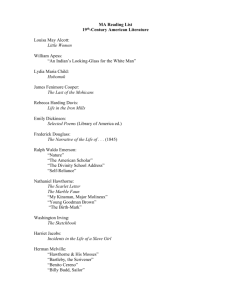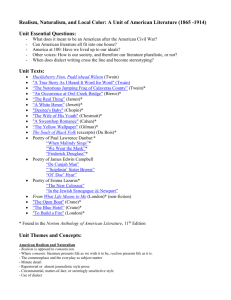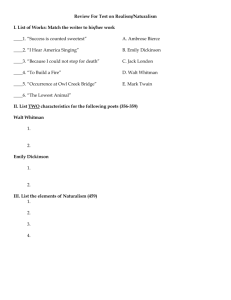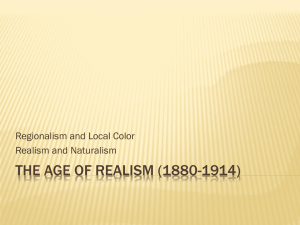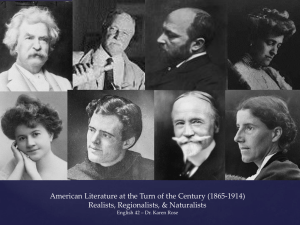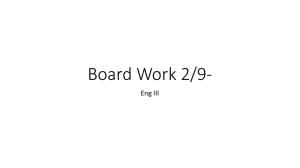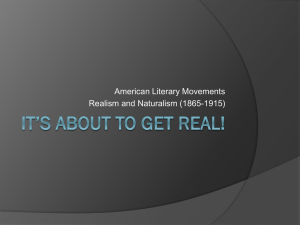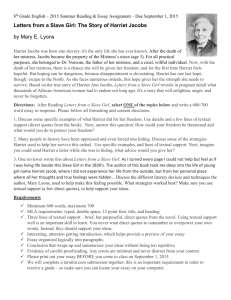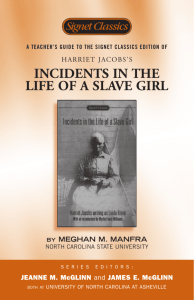English 243—American Literature: Beginnings to
advertisement
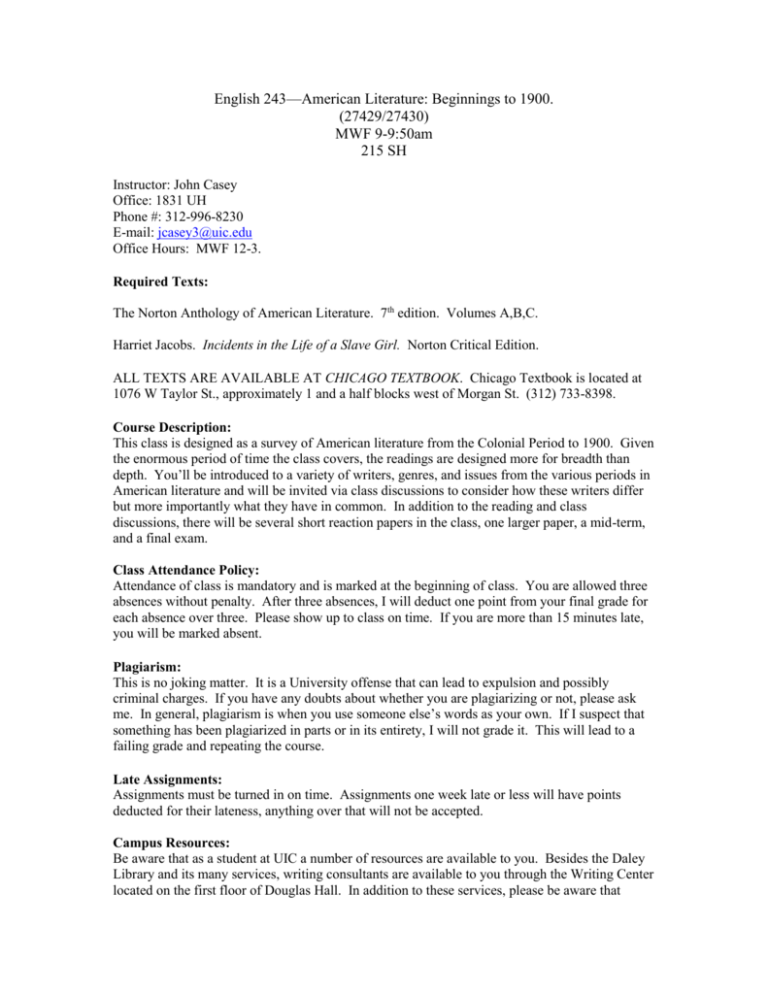
English 243—American Literature: Beginnings to 1900. (27429/27430) MWF 9-9:50am 215 SH Instructor: John Casey Office: 1831 UH Phone #: 312-996-8230 E-mail: jcasey3@uic.edu Office Hours: MWF 12-3. Required Texts: The Norton Anthology of American Literature. 7th edition. Volumes A,B,C. Harriet Jacobs. Incidents in the Life of a Slave Girl. Norton Critical Edition. ALL TEXTS ARE AVAILABLE AT CHICAGO TEXTBOOK. Chicago Textbook is located at 1076 W Taylor St., approximately 1 and a half blocks west of Morgan St. (312) 733-8398. Course Description: This class is designed as a survey of American literature from the Colonial Period to 1900. Given the enormous period of time the class covers, the readings are designed more for breadth than depth. You’ll be introduced to a variety of writers, genres, and issues from the various periods in American literature and will be invited via class discussions to consider how these writers differ but more importantly what they have in common. In addition to the reading and class discussions, there will be several short reaction papers in the class, one larger paper, a mid-term, and a final exam. Class Attendance Policy: Attendance of class is mandatory and is marked at the beginning of class. You are allowed three absences without penalty. After three absences, I will deduct one point from your final grade for each absence over three. Please show up to class on time. If you are more than 15 minutes late, you will be marked absent. Plagiarism: This is no joking matter. It is a University offense that can lead to expulsion and possibly criminal charges. If you have any doubts about whether you are plagiarizing or not, please ask me. In general, plagiarism is when you use someone else’s words as your own. If I suspect that something has been plagiarized in parts or in its entirety, I will not grade it. This will lead to a failing grade and repeating the course. Late Assignments: Assignments must be turned in on time. Assignments one week late or less will have points deducted for their lateness, anything over that will not be accepted. Campus Resources: Be aware that as a student at UIC a number of resources are available to you. Besides the Daley Library and its many services, writing consultants are available to you through the Writing Center located on the first floor of Douglas Hall. In addition to these services, please be aware that counseling for academic issues is available through the Academic Center for Excellence (ACE) and for personal issues through the Counseling Center, both of which are located in the Student Services Building (SSB). Students with disabilities who require accommodations for access and participation in this course should be registered with the Office of Disability Services. Please contact the Office of Disability Services at 312-413-2183 (voice) or 312-413-0123 (TTY). Grading: Reaction Papers: 20% Course Paper: 20% Mid-term Exam: 20% Final Exam: 20% Class Participation: 20% (Note: Participation involves more than just showing up. It also means taking part in classroom discussions and activities, listening, and being respectful of others in the class). Week 1: Colonial Period. 08/27- Introduction to the class. Review syllabus. 8/29- Conflicts of Narration: Native American Mythology vs. Tales of Exploration. Stories of the Beginning of the World (pages 17-31), Native American Trickster Tales (72-74, 98-103), Christopher Columbus (pages 31-35), John Smith (pages 55-66). 8/31- The Puritan Experiment. William Bradford (pages 104-09, 120-26), John Winthrop (pages 147-58), Roger Williams (pages 173-78, 184-86), Anne Bradstreet (pages 187, 204-05, 210-11, 212-13, 213-17), Cotton Mather (pages 307-13). Week 2: Early Republic. 9/3- No Class. Labor Day. 9/5-Jonathan Edwards (pages 384-96, 425-36). 9/7- Benjamin Franklin (pages 449-57, 463-68, 468-72, 488, 526-31). ADD/DROP PERIOD ENDS. Week 3: Early Republic (cont.) 9/10- Thomas Jefferson (pages 649-51, 658-60, 664-65), J. Hector St. John De Crevecoeur (pages 595-05). 9/12- Thomas Paine (pages 629-37, 643-49), Thomas Jefferson (pages 651-657, 660-64), The Federalist (pages 665-74). 9/14- Phillis Wheatley (pages 751-52, 760-62), Royall Tyler (pages 764-805). Week 4: Transcendentalism. 9/17- Emerson (pages 1106-10, 1138-51, 1163-80, 1195-1213). 9/19- Thoreau (pages 1853-1914). 9/21- Fuller (pages 1637-59, 1677-81). Week 5: The American Renaissance. 9/24- Hawthorne (pages 1272-75, 1352-77, 1493-95). 9/26- Hawthorne [cont.] (pages 1377-1438). 9/28- Hawthorne [cont.] (pages 1438-93). Week 6: The American Renaissance (cont.) 10/1- Edgar Allen Poe (pages 1528-32, 1536-39, 1589-92, 1593-99, 1617-26). 10/3- Melville (pages 2304-20, 2363-89, 2405-61). 10/5- Whitman (pages 2190-95, 2210-54, 2263-72, 2279-81, 2282-88). Last Day for a Late Withdrawal. Week 7- The Other American Renaissance. 10/8- Harriet Beecher Stowe (pages 1698- 1732). 10/10- Harriet Beecher Stowe [cont.] (pages 1732-92) 10/12- Lydia Maria Child (pages 1078-1106). Week 8- The Other American Renaissance (cont.) 10/15- Caroline Kirkland (1068-1078), Fanny Fern (pages 1792-1807), Elizabeth Drew Stoddard (pages 2524-38). 10/17- Emily Dickinson (pages 2554-58, 2565, 2567, 2576, 2578, 2590, 2594). 10/19- MID-TERM EXAM. Week 9- Slave Narrative. 10/22- “Slavery, Race, and the Making of American Literature” (pages 1682-98). 10/24- Frederick Douglass (pages 2060-2129, 2140-43). 10/26- William Wells Brown (pages 1829-1853). Paper Draft Due. Week 10- Slave Narrative (cont.) 10/29- Harriet Jacobs (pages ix-77). 10/31- Harriet Jacobs [cont.] (pages 77-123). 11/2- Harriet Jacobs [cont.] (pages 123-158). Week 11- Realism and Naturalism. 11/5- “Realism and Naturalism.” (pages 911-30) 11/7- Henry James (pages 388-429), Edith Wharton (pages 829-852). 11/9- Charlotte Perkins Gilman (pages 806-820). Week 12- Realism and Naturalism (cont.) 11/12- Stephen Crane (pages 954-1000). 11/14- Ambrose Bierce (pages 359-370), Jack London (pages 1051-1067). 11/16- Theodore Dreiser (pages 938-954), Frank Norris (pages 931-38). Week 13- Local Color/Regionalism. 11/19- Mary Wilkins Freeman (pages 625-645), Sarah Winnemucca (pages 501-512). 11/21- Kate Chopin (pages 529-625). Thanksgiving Holiday (11/22-23). NO CLASS. Week 14- Local Color/Regionalism (cont.) 11/26- Bret Harte (pages 324-346). 11/28- Hamlin Garland (pages 752-762), Abraham Cahan (pages 762-806). 11/30- Joel Chandler Harris (pages 512-516), Charles Chesnutt (pages 688-96), John M. Oskison (pages 1046-51). Week 15- Local Color/Regionalism (cont.) 12/3- Mark Twain (pages 100-104, 108-74). 12/5- Mark Twain [cont.] (pages 174-241). 12/7- Mark Twain [cont.] (pages 241-294). Last day of classes. Final Exam. Appendix A: Reaction Papers. Once a week I will expect you to post a short (2-3 pages double spaced) reaction paper on the course Blackboard site. This paper should be on one particular story or author, or an issue that you see connects several authors that we have read. One way to approach this is to start with a question you have about something you have read, or to make an observation on a theme, character, or plot issue. Example: Jonathan Edwards and Benjamin Franklin both came from New England, read many of the same books, lived during the same time period. Yet I couldn’t imagine two more different people. Why do you suppose they started with such similar origins and went down such different paths? Or: Having read material written by actual Puritans, how does Hawthorne’s portrait of them compare to it? Do you think the Scarlet Letter is unfair to the Puritans or is it fairly accurate? Once you have decided upon a paper topic, reaction papers should be focused on writing that helps you develop your argument and analysis for your paper. Appendix B: Course Paper. Similar in concept to the reaction papers, only longer, the paper for the course will ask you to do an in-depth examination of an author, text, or issue. Just as with the reaction paper, sometimes it helps to start with a question or issue that you find of interest. Example: What makes an author a “realist?” How does realism compare to “naturalism?” One way to answer these large questions would be to compare to authors from each supposed school. Look at how Henry James method of narration compares to that of Dreiser or Jack London. What do details from each story tell you about the author and their style? Appendix C: Mid-Term and Final Exam. Both exams will contain four sections: matching, short answer, passage identification, and your choice of two essay questions. Mid-term exam covers material up to week eight. Final exam is cumulative.
